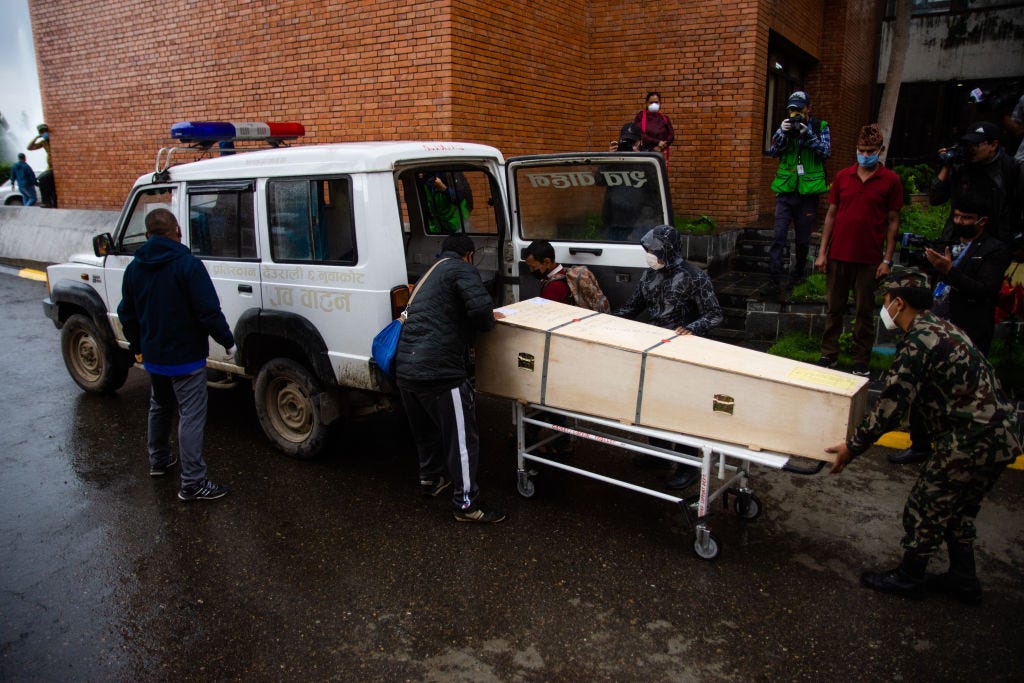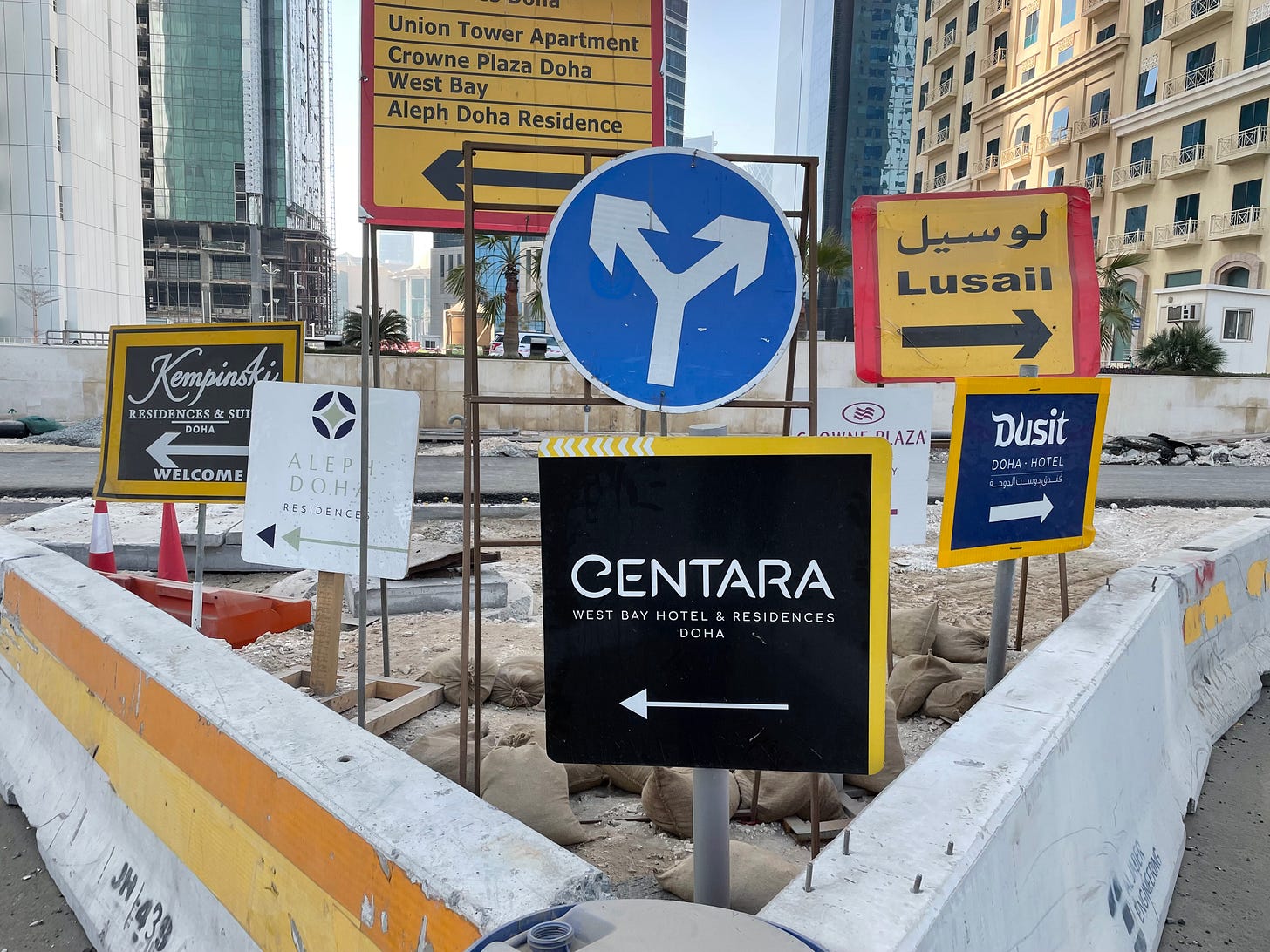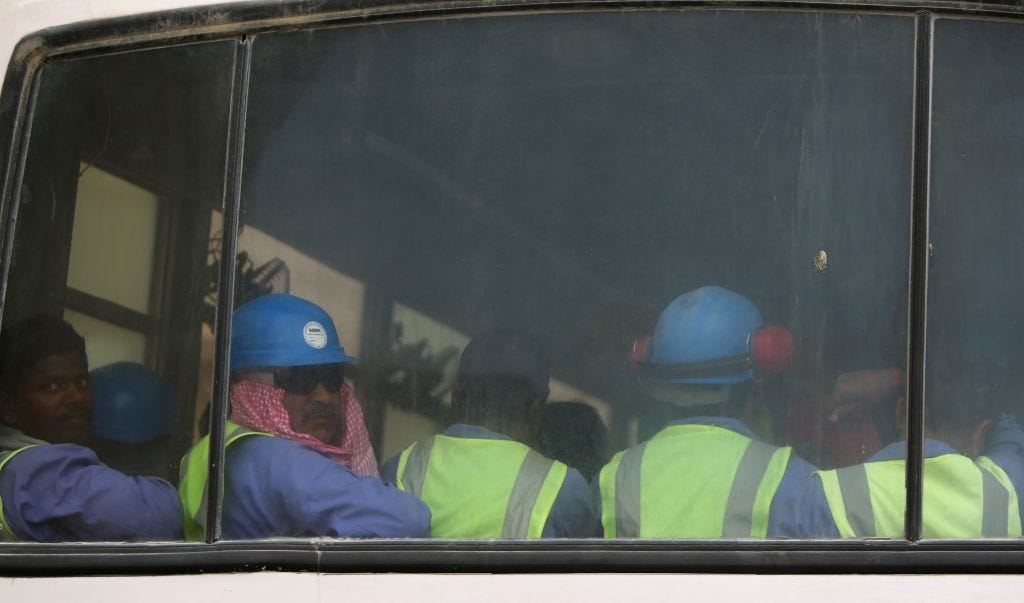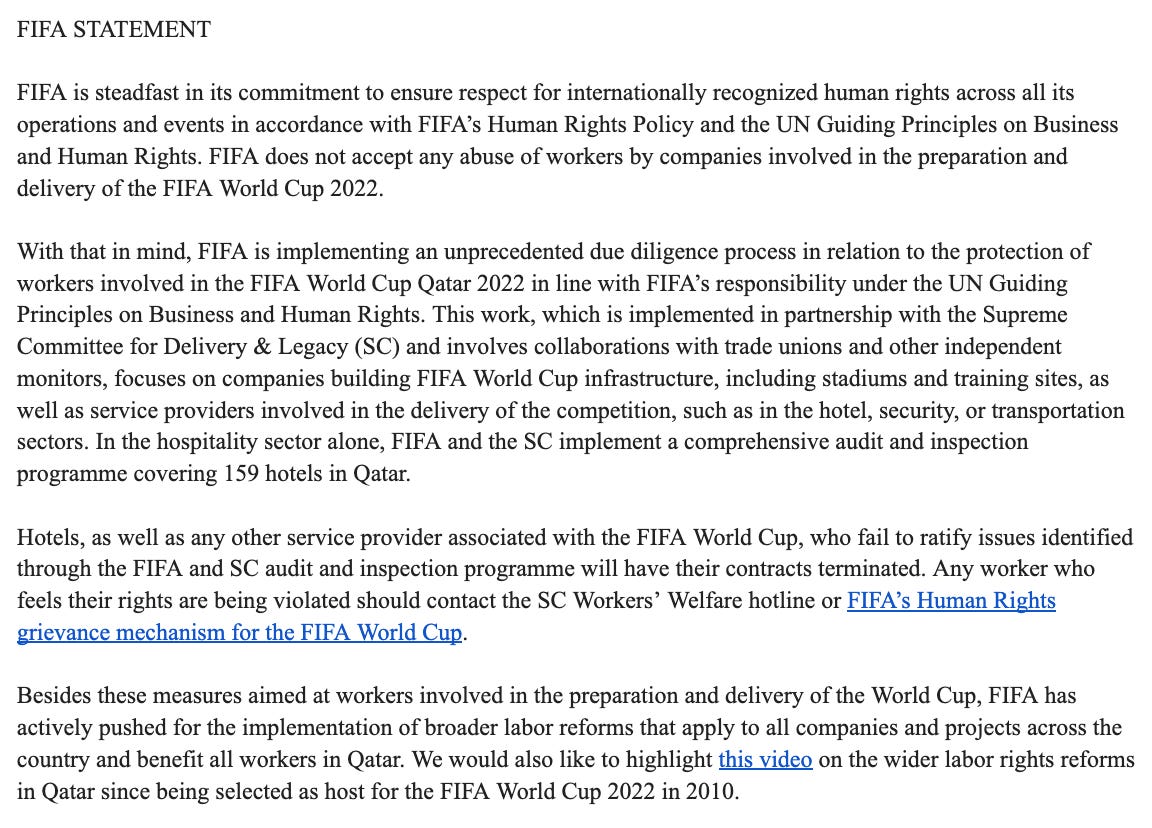Premium: The Qatar Chronicles, Part I
World Cup host Qatar enacted new laws that it said would improve conditions for migrant workers. But are those laws being followed? We went to Qatar and spoke to workers at 14 FIFA hotels in Doha.
DOHA, Qatar — They’re everywhere here in Qatar, even if nobody acts like they see them.
The authoritarian Persian Gulf nation that will host World Cup 2022 has 2.1 million migrant workers, who make up 95 percent of Qatar’s workforce and 73 percent of its population. If you spend any time at all in Qatar, you’ll see sprawling groups of blue-clad, neon-vested laborers, largely from the Indian subcontinent, toiling in the sun on construction sites and roadsides. If you stay at a gleaming new hotel, chances are the valets, the security guards and the staff cleaning your rooms and serving your food are from somewhere in East or West Africa.
In my experience, which has included weeklong trips to Doha in 2013 for Sports Illustrated and in 2022 for this story, migrant workers are treated by Qataris as though they are invisible—unless locals in the planet’s wealthiest nation per capita are unhappy with, say, their service at a restaurant or private hotel cabana, when they can be bracingly cruel to the waitstaff.
Looming over everything are Qatar’s migrant worker death toll (often related to long hours in the infernal heat) and its apathy toward investigating the cause of those deaths. Last year, The Guardian’s Pete Pattisson cited government sources to report that more than 6,500 migrant workers had died in Qatar in the decade since the country was awarded the World Cup in 2010. (A total of 38 deaths have been directly tied to World Cup stadium construction, though nearly all of Qatar’s infrastructure growth has some connection to the World Cup.)
GrantWahl.com is a reader-supported soccer newsletter, and this is how I make my living. Traveling to Qatar to do independent journalism requires resources. The best way to support me and my work is by taking out a paid subscription now.
For its part, Amnesty International cited data from Qatar’s Planning and Statistics Authority that an even higher number—15,021 non-Qataris of all ages, occupations and causes—had died in Qatar in the past decade. (Qatari officials claim the migrant mortality rate is within the expected range given the workforce size.) Just as troubling, Amnesty says Qatar has failed to properly investigate up to 70 percent of its migrant worker deaths, noting that “in a well-resourced health system, it should be possible to identify the exact cause of death in all but 1 percent of cases.”

When the World Cup starts on November 20, the primary focus for billions of fans around the globe will be the soccer on the field. The same will be true for thousands of visiting sports media, including me. But I didn’t feel right about covering the soccer in Qatar without first visiting and doing independent reporting, speaking to migrant workers about their experience there. And I thought my readers would want to know: What is life like on the ground for these workers? What has Qatar actually done to improve conditions for its workforce since it got the World Cup 12 years ago?
By the time I arrived earlier this year, World Cup stadium construction was basically complete. And so for Part I of The Qatar Chronicles, I traveled to Qatar in late February and trained my energy on migrant workers in the hotel sector. In Part II, I’ll detail what U.S. Soccer has been doing behind the scenes to prepare for the non-soccer aspects of a World Cup in Qatar, including educating its players and doing due diligence on its hotel and vendors, as well as addressing LGBTQ+ rights in a country that represses them.
My plan for Part I: to visit all 14 of the FIFA-affiliated hotels in the main sections of Doha in the West Bay and The Pearl (including where the USMNT will be staying), and speak to at least one migrant worker at each one.
Promising them anonymity for their protection, I wanted to hear their thoughts. How were they being treated by their employers? And was the new set of worker-protection laws announced by the Qatari government to its own great fanfare in 2019 actually being followed on the ground?
There was a reason I didn’t publicize my Qatar visit on social media and didn’t say anything publicly about it until I had left the country. The fact is that journalists can get detained in Qatar—including two reporters for the Norwegian TV World Cup rights holder last November—and I wasn’t hoping for a repeat of that during my time there.
More importantly, risk is ever-present for workers, too. Malcolm Bidali, a Kenyan who worked as a security guard in Qatar and wrote a human rights blog under a pseudonym, was detained for five months last year (often in solitary confinement) by the Qatari authorities and eventually deported for spreading “fake news,” creating a chilling effect across the migrant worker community.

But independent reporting on Qatar is important. In early September, the Qatari government spent a large sum of money to provide first-rate travel and accommodations to journalists from around the world who visited Doha, with the expectation that they would report favorably on Qatar’s readiness to host the World Cup. Not surprisingly, many did. Accepting thousands of dollars in free travel from the people you’re covering is a violation of ethics for reputable media organizations. Nor is it independent reporting when Qatar’s Supreme Committee organizing the World Cup hand-picks migrant workers to speak to the media.
For me, the only way to do truly independent reporting was to use GrantWahl.com’s money (your paid subscriptions matter, so consider subscribing) and travel to Qatar, spend two days in a state-mandated COVID hotel quarantine, deal with a government-required COVID phone app that doubled as a surveillance tracker, and then introduce myself to random migrant workers at those 14 FIFA hotels. I had to earn their trust in 90 seconds, explain who I was, give them my business card and ask them questions about their experience.
I was also well aware that I shouldn’t arrange any interviews in Qatar with government- or World Cup-affiliated groups. When I did that during my trip in 2013 for a Sports Illustrated story, the Qataris made sure to fill my schedule with so many meetings that they knew I wouldn’t have time to do any reporting on my own. This time, I waited until after I returned from my visit to contact Qatari authorities and FIFA for their perspectives.
In the end, the only thing I wanted to do on this trip was to interview migrant workers. And that’s all I did. Several of them have stayed in touch since then via WhatsApp. For their honesty and trust I am grateful. I also recorded some audio tracks as I went through the reporting process in real time:
Which laws have changed for migrant workers in Qatar since December 2010, when it won the right to host the World Cup? In 2019, after years of pressure from human rights organizations and global trade unions, Qatar announced sweeping labor reforms that it said marked the end to the kafala system, common in the gulf states, which required migrants to have sponsors who controlled their exit visas and could thus prevent them from leaving the country.
“For the first eight, nine years, there had been no progress, and the ongoing abuses and exploitation of migrant workers continued because there was a bit of a denial from both Qatar and FIFA about the need to do any reforms,” May Romanos, a lawyer and Amnesty International Gulf researcher on human rights who has worked in Qatar since 2017, told me. “Qatar finally agreed [to reforms] I think because of the ongoing pressure and the spotlight it came under because of this World Cup. They signed an agreement with the International Labor Organization [ILO] committing to a reform program and started to introduce some important legal reforms.”
“Three years after the start of this program, we have seen some important legal reforms being introduced,” Romanos went on. “Now migrant workers can leave the country and can change jobs without the permission of their employer. There is a new minimum wage”—1,000 Qatari riyals a month, or $3,296 a year—“and new labor committees that are supposed to expedite the access for justice for migrant workers. So the legal framework is better, but the implementation and enforcement are weak. And there have been also ongoing loopholes in the system that allow abusive employers to continue exploiting migrant workers.”
According to the new laws, it is now illegal in Qatar:
• For employers to keep the passports of their workers,
• For employers to prevent their workers from changing jobs inside Qatar if they so desire, and
• For workers to pay a “recruitment fee” (sometimes $2,500 or more) to agents in their home country or in Qatar to secure employment in the country.
But are those new Qatari laws being enforced on the ground? The only way to find out for yourself is to go to Qatar, walk around Doha and talk to the workers themselves.
At first, I was really, really bad at that! Because I was staying at one of the 14 FIFA hotels in Doha’s West Bay—all of which are high-end international brands—I was able to station myself on a relatively quiet beach chair near the outdoor swimming pool. Over at the bar, hotel guests were ordering beers and cocktails, which are a lot easier to find in Doha today than they were when I visited nine years ago.
When a worker from the pool staff walked by, I stopped him, introduced myself, gave him my business card and explained my story, adding that I would look forward to interviewing him when he wasn’t on the clock if he wanted to send me a message. (I wanted to respect that he was busy doing his job and would probably prefer a more discreet location.) He smiled and took my card, and quite reasonably I never heard from him again.
By the time I recorded my second audio track the next morning, you could hear some anxiety in my voice. Time was running out on my stay in Doha, and I needed to start getting some interviews done. I resolved to continue being discreet (it helped not to have TV cameras with me), but from now on I would try to strike up a conversation the moment I met someone.
In the end, I spoke to a total of 20 workers at all 14 FIFA hotels in Doha’s West Bay and The Pearl, and I did interviews at all but one hotel, which happened to be the one I was staying at. Long story short: The vast majority of the migrant hotel workers in Doha are men, so I wanted to interview at least one woman. When I introduced myself to a woman working in the lobby of my hotel, she asked to bring me to their corporate communications head. I explained I was speaking to workers themselves. She asked for my name, and I gave her my first name before racing upstairs, packing my bags and checking out immediately. By that time, thankfully, I was well on my way to completing my interviews.
By the time I was done, I had a mixed bag of responses in a few areas, but some clear patterns emerged about which new laws were being enforced and which weren’t.
Passport confiscation. The majority of the workers I spoke to at FIFA hotels said they had possession of their passports. But multiple respondents told me their employers had control of their passports, in clear violation of the new Qatari law. “It has now been three years without my passport,” an East African security guard who said he works seven days a week, 12 hours a day, told me. “I’m supposed to ask the company for my passport when I finish.”
At another FIFA hotel, an East African bellman who works six days a week, 12 hours a day, told me his employer “kept my passport for three months. When I finished three months, I was qualified. They returned my passport to me and gave me a Qatari ID.”
The workers I spoke to who didn’t have their passports did not work directly for their hotels, but rather for subcontractors who have agreements to provide laborers for the hotels. I quickly learned from speaking to workers that subcontractors are far more often in violation of Qatari laws than the hotels themselves are with their direct employees. But that doesn’t absolve the hotels of responsibility; the subcontracted employees are still working at their properties.
“Passport confiscation is illegal, but it’s still happening,” Amnesty’s Romanos told me. “You will find it with many migrant workers, including domestic workers. You rarely find a domestic worker in possession of her passport.”
Sharan Burrow, the general secretary of the International Trade Union Confederation (ITUC), was one of Qatar’s most vocal critics before the legal reforms were announced in 2019. When I interviewed her in 2014, she told me: “Qatar is a country without a conscience,” as the ITUC demanded that FIFA take a revote for the host of World Cup 2022.
But when I interviewed Burrow eight years later for this story, the global trade union leader had done a near-180 on the Qatari government’s stance toward migrant workers. What happened? Well, these days she and the ITUC, as well as the ILO and several other global trade unions, are working with the Qatari state, following their negotiated agreement in 2019.

“We got to the point [in 2014] where I was totally frustrated with [Qatar’s] lack of interest in the issues, in talking to us or indeed the International Labor Organization in dialogue, to look at how to fix the problems,” Burrow explained to me. “So as the workers, the union, took a complaint to the ILO, the highest form of complaints is called an Article 26. And it’s basically heard before the governing body of the ILO. Its ultimate end could be in sanctions, but we were determined to continue to offer the route of negotiations, because we wanted to change the laws and change the country, not to actually just see the country punished. And at a certain point [Qatar] decided to negotiate, and so the ILO and the ITUC, represented by myself and my legal team, sat down, and we negotiated an agreement for legal changes that would be effected over three years. And they were. And so those changes are in place.”
You can’t help but notice the tensions these days over Qatar between the global trade unions (which have joined forces with Qatar following the settlement) and human rights organizations like Amnesty International (which continue to release reports about the new laws not being enforced on the ground). Perhaps that’s not surprising given the structural differences between unions and human rights groups.
“Unions were probably one of the main critical voices when it came to Qatar in 2014,” Amnesty’s Romanos told me. “They brought a complaint accusing Qatar of forced labor, which eventually pushed the country to agree to this reform process. Since then, many of the unions backed the reform process, supporting Qatar and the ILO to deliver on these reforms. They considered the progress that has been made as one that should be celebrated for improving workers’ rights and conditions in the country. Whereas for us, we see our role as a human rights organization that should continue to monitor the situation and acknowledge progress, but also point to the gaps and continue to push the government to reform the system. As long as we continue to document human rights abuses, we will continue to speak up and ask for more.”
As for the ongoing confiscation of workers’ passports inside Qatar, Burrow spoke like someone who’s now a Qatari government insider. “If you’re still in touch with those people and they don’t have a passport, suggest they ask for it back,” Burrow told me in an interview. “And if they don’t, then I’d love to help them, because one phone call and I could fix that.”
Recruitment fees for agents. About half the workers I spoke to at the 14 FIFA hotels, including several who had moved from their countries to Qatar after the new laws had been announced, said they’d had to pay recruitment fees to agents, which is illegal.
“In our country we paid agents,” an East African security guard who works six days a week, 12 hours a day, told me. “They told us we are supposed to pay, so we paid. It was around 5,000 riyals [$1,373].” That put the worker in a hole of debt that he had to start digging out from the moment he arrived in Qatar.
“The payment of recruitment fees is just a rampant issue,” Amnesty’s Romanos says, even after the new Qatari laws were announced. “Over 70 percent of low-skilled migrant workers in the country would have paid recruitment fees to come to work in Qatar.”
The ITUC’s Burrow, who’s working with the Qatari government, says: “The recruiting fees remain a problem. And you can’t actually blame the Qatari government for this one, because they’re deregistering any recruitment agency in Qatar where they have the power. They did like 20 in the last couple months which are not indeed heeding the laws. But it’s the countries of origin that we have a problem with. And even though in some of those countries the Qataris set up their own visa center, there are still agents that are charging to get people through the door. So it remains a real problem. It’s not just limited to recruits to Qatar. It’s recruits to almost every Gulf state.”
The ability for migrant workers to choose to change jobs inside Qatar. One of the watershed aspects of the new Qatari laws was supposed to be workers’ ability to choose to leave their job for another one inside Qatar without needing permission from their employer. But a clear majority of the workers I spoke to said that was not possible with their employers, which is illegal.
Here’s a selection of what workers told me: “You can’t change your job. If you need to, they send you home and you come back with a new visa for a new company.” … “It’s very difficult to change jobs. For our company, they don’t allow it.” … “The transfer from one company to another company is the main issue. It’s almost not possible, because they require permission from your employer, which most of the companies aren’t giving.” … “I would change my job if I could, but it’s not possible.” … “I got another [job] offer, but my company doesn’t allow changing.”
When I informed the trade union’s Burrow how many workers in Qatar told me they couldn’t change their jobs, she said: “Well, they can. And 242,000 workers did change jobs from October 2020 to October 2021. The problem is no longer with the laws.”
Yet clearly there is a major problem if so many workers told me it wasn’t possible. Amnesty’s Romanos said: “On paper, you can change jobs because you don't need the permission of your employer. But then your employer can retaliate by filing absconding cases against you and canceling your Qatari ID to block your job transfer, meaning that you are then at risk of being forced to leave the country or be deported because you ran away from your job, which is still considered an offense.”

Wages. One new law that appeared as though it was being followed was Qatar’s new minimum-wage law of 1,000 riyals a month (or $3,296 a year). None of the workers I spoke to said they were being paid below the minimum wage, and none said they were failing to be paid on time.
That’s not to say that it doesn’t still happen. “The issue of unpaid salaries remains rampant, with thousands of cases being heard in court,” Amnesty’s Romanos told me.
On wages, the ITUC’s Burrow, who works with the Qatari government, said: “There’s a minimum wage that is evidence-based, and it has a capacity to be reviewed regularly. It includes not just a wage base but an allowance for food and accommodation. And the minimum wage not only raised wages for about 300,000 workers, it ended the apartheid system of wages where some nations, like Nepalis, were paid less than Indians. It is also applicable to domestic workers and probably the only country in the world where domestic workers are guaranteed the minimum-wage equivalent to any other worker.”
What do you see when you look at Qatar’s minimum wage? Progress or outrage? Qatar is the richest country on the planet measured by GDP per capita. The new minimum wage works out to about $1.25 an hour. That’s shockingly low by Western standards. But it’s also an improvement over what used to be the case.

At the end of every interview I did with a migrant worker, I asked a question: Do you regret coming to Qatar? I heard plenty of criticism about living conditions and work hours and day-to-day aspects of their jobs. But it was admittedly striking that nobody I spoke to said they regretted coming to Qatar. A lot goes into that answer, obviously, especially the conditions in the countries where those migrant workers come from.
“From the job side, it’s cool,” a West African security guard told me. “I work 12 hours a day, seven days a week. They say all work and no play make Jack a dull boy. So I’m dull. For real.”
“Do you like it here?” I asked.
“Not really,” he said. “But you know, I don’t have a choice. The reason is I’m saying if you compare it to my country, here I’ve got a job. So it’s OK, but not really. I mean, I don’t like it here like I want to stay here forever. But because of the job, that’s why I’m here.”
When I told Amnesty’s Romanos none of the workers I interviewed said they had regrets about coming to Qatar, she said she wasn’t surprised.
“That’s exactly what I was expecting the answer to be,” she told me. “I think this stems from why they come to Qatar in the first place. They just come in search of better job opportunities. They tell you, ‘I’m here to work so I can send my kids to a good school so that my kids don’t have to go through what I’m going through.’ That's why migrant workers migrate in the first place. They want to make a better future for themselves, for their families back home and their kids. And I think this remains the ultimate reason that pushed them to leave their home countries.”
“For many it’s not necessarily the harsh working conditions that push them to complain,” Romanos went on. “It’s just the way they are treated. All they ask for is: ‘Treat us humanely and pay us our money, because that’s why we’re here.’ They’re not asking for much, right? They understand that they’re not in Qatar on a vacation. It’s not a job where you’re going to have fun and enjoy it. But it will be enough to pay your recruitment loan back home and support your family somehow. That’s why we say don’t use people’s vulnerability to allow for your system to exploit them. It’s not OK to say: They come from different or less privileged backgrounds, so whatever we offer them here is better than what they get back in their home countries. Qatar, like any other government, has an obligation to ensure that every person on its territory is enjoying their human rights, including being treated fairly and paid on time and not suffering any labor abuses.”
The message came from David (not his real name) in Qatar on WhatsApp in May, in reference to FIFA inspections and the subcontractor he works for:
David: Hey brother
I’m David in Qatar one day you did for us interview
Me: Hi David, it’s good to hear from you. How are you?
David: I’m good brother you are still in qatar
Me: Good to hear. I am at home in New York now. I’ll be in Qatar for the World Cup in November and December.
David: OK I want you to come in our company yu see how we live cause this people are lies they brought other people to interview in accommodation and they lock us inside another accommodation for us to not talk with fifa people
Me: I’m so sorry to hear that. Are you OK?
David: My company is called ----- it is very bad we pass alot off staff but people are afraid to say that why I look for your number
Me: Thanks for contacting me. I’m writing a story soon on worker treatment in Qatar. Would you be OK speaking to me again? I wouldn’t use your name.
David: This is how we live six people per room
People working in hotel are living good two people per room but us supply company we pass alot of staff and your fifa people are hide alot of things. If you work in hotel they will give you good place to live most people are suffering from this contract company they treat us like animals
I still get regular WhatsApp messages from some of the workers I interviewed in Qatar. Most of them are questions about whether I can help them obtain work visas for the United States. It’s difficult. There’s almost nothing I can do in that area.
When I visited Qatar in February, as I mention in the audio track below, it did not appear that FIFA was doing due diligence on hotels and subcontractors supplying those hotels with laborers. But as FIFA mentions in its statement below, it has since conducted an audit of Qatari hotels. Based on the WhatsApp message I received above, it’s fair to ask if those FIFA audits are being corrupted by some of those being audited.
Here’s the statement FIFA sent to me for this story, including links to its workers grievance mechanism and video on labor reforms:
And here’s the statement sent to me by the Qatari government:
In May, Amnesty International issued a new report and a public call for FIFA and the Qatari government to create a fund for Qatar’s migrant workers of $440 million—an amount equal to the prize money FIFA will give for World Cup 2022.
So far, FIFA and Qatar have not responded. Amnesty’s Romanos hopes the players from the 32 World Cup teams will speak up on behalf of Qatar’s migrant workers.
“When FIFA awarded Qatar the right to host this World Cup, it knew or should have known about the labor abuses that would happen as a result of the labor system in place in the country,” Romanos told me. “It wasn’t a secret. It was well-documented that there is the kafala system, exploitation will happen. Migrant workers will be the ones building this World Cup and preparing Qatar to host it. Yet FIFA chose to give Qatar this right without imposing on the country any labor conditions to protect migrant workers.”
“So fast forward 10 years,” she went on, “and we’ve seen lots of abuses. While acknowledging some reforms are being put in place, we shouldn’t forget the past abuses. A lot of people suffered: those who died, those who lost their salaries, those who paid recruitment fees. That’s why we call on FIFA to work with the Qatari government to set up a remedy program to compensate workers who suffered to make this World Cup.”
The migrant workers I spoke to on my visit to Qatar were, to a person, extremely thoughtful. Several had educations that in the U.S. would have targeted them for much higher-paying jobs. Their dignity and honor give them powerful voices.
“Some people might have come through some bad things here by not going through proper channels,” one worker told me. “If you go through the proper channels, your government knows you’re here, the government of Qatar knows you’re here. But if you step out of channels, you won’t be treated good. Because they know you’re different. The law is not on your side.”
Another told me: “We appreciate the improvement made by the [Qatari] government. I don’t think they will go back [to previous laws after the World Cup]. But the issues are on ground level. The laws are OK, but implementation at the ground level, there’s some improvement needed. The people in management in companies—that’s the challenge in implementing the rules.”
Part II of The Qatar Chronicles has also been published.








Thank you so much Grant for covering this. These kinds of stories are definitely a big reason why I recently subscribed. Looking forward to part 2.
I do wonder if publishing this sort of thing will affect your ability to cover the tournament in November. I certainly hope not.
Thanks, Grant, for covering this important story.